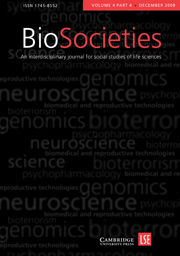Crossref Citations
This article has been cited by the following publications. This list is generated based on data provided by
Crossref.
Mykhalovskiy, Eric
Armstrong, Pat
Armstrong, Hugh
Bourgeault, Ivy
Choiniere, Jackie
Lexchin, Joel
Peters, Suzanne
and
White, Jerry
2008.
Qualitative research and the politics of knowledge in an age of evidence: Developing a research-based practice of immanent critique.
Social Science & Medicine,
Vol. 67,
Issue. 1,
p.
195.
Derkatch, Colleen
2008.
Method as Argument: Boundary Work in Evidence‐Based Medicine.
Social Epistemology,
Vol. 22,
Issue. 4,
p.
371.
Joseph, Stephen
Beer, Charlotte
Clarke, David
Forman, Allan
Pickersgill, Martyn
Swift, Judy
Taylor, John
and
Tischler, Victoria
2009.
Qualitative Research into Mental Health: Reflections on Epistemology.
Mental Health Review Journal,
Vol. 14,
Issue. 1,
p.
36.
Lézé, Samuel
2009.
Politique du freudisme : crise de la clinique et contrôle des problèmes personnels.
Journal des anthropologues,
p.
413.
Solomon, Olga
2010.
Sense and the Senses: Anthropology and the Study of Autism.
Annual Review of Anthropology,
Vol. 39,
Issue. 1,
p.
241.
Beck, Stefan
2011.
Staging Bone Marrow Donation as a Ballot: Reconfiguring the Social and the Political Using Biomedicine in Cyprus.
Body & Society,
Vol. 17,
Issue. 2-3,
p.
93.
de Leon, Jose
2012.
Evidence-Based Medicine Versus Personalized Medicine.
Journal of Clinical Psychopharmacology,
Vol. 32,
Issue. 2,
p.
153.
Singh, Nirbhay N.
Lancioni, Giulio E.
Karazsia, Bryan T.
Winton, Alan S. W.
Myers, Rachel E.
Singh, Ashvind N. A.
Singh, Angela D. A.
and
Singh, Judy
2013.
Mindfulness-Based Treatment of Aggression in Individuals with Mild Intellectual Disabilities: A Waiting List Control Study.
Mindfulness,
Vol. 4,
Issue. 2,
p.
158.
Pearce, Warren
Raman, Sujatha
and
Turner, Andrew
2015.
Randomised trials in context: practical problems and social aspects of evidence-based medicine and policy.
Trials,
Vol. 16,
Issue. 1,
Virtanen, Mikko J.
2015.
Ethik – Normen – Werte.
p.
299.
Savransky, Martin
and
Rosengarten, Marsha
2016.
What is nature capable of? Evidence, ontology and speculative medical humanities.
Medical Humanities,
Vol. 42,
Issue. 3,
p.
166.
Askheim, Clemet
Sandset, Tony
and
Engebretsen, Eivind
2017.
Who cares? The lost legacy of Archie Cochrane.
Medical Humanities,
Vol. 43,
Issue. 1,
p.
41.
Norlyk, Annelise
Haahr, Anita
Dreyer, Pia
and
Martinsen, Bente
2017.
Sygeplejefagets teorigrundlag som værnmod McDonaldisering.
Klinisk Sygepleje,
Vol. 31,
Issue. 3,
p.
231.
Norlyk, Annelise
Haahr, Anita
Dreyer, Pia
and
Martinsen, Bente
2017.
Lost in transformation? Reviving ethics of care in hospital cultures of evidence‐based healthcare.
Nursing Inquiry,
Vol. 24,
Issue. 3,
Morris, Christopher
2017.
Biopolitics and Boundary Work in South Africa’sSutherlandiaClinical Trial.
Medical Anthropology,
Vol. 36,
Issue. 7,
p.
685.
Weßling, Heinrich
2018.
Evidenzbasierte Praxis in den Gesundheitsberufen.
p.
65.
Hendy, Katherine
2018.
Plant Medicines, Healing and Psychedelic Science.
p.
151.
Carr, E. Summerson
and
Obertino-Norwood, Hannah
2022.
Legitimizing evidence: The trans-institutional life of evidence-based practice.
Social Science & Medicine,
Vol. 310,
Issue. ,
p.
115130.
Premkumar, Ashish
and
You, Whitney B.
2022.
The (After)life of a Trial: Biocommunicability of an At-Risk Pregnancy.
Medical Anthropology,
Vol. 41,
Issue. 8,
p.
794.
Berg, Henrik
Askheim, Clemet
Heggen, Kristin M.
Sandset, Tony J.
and
Engebretsen, Eivind
2022.
From evidence‐based to sustainable healthcare: Cochrane revisited.
Journal of Evaluation in Clinical Practice,
Vol. 28,
Issue. 5,
p.
741.


